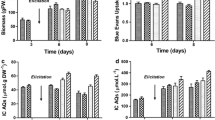Abstract.
Production of a novel antimicrobial tropolone, β-thujaplicin, in Cupressus lusitanica suspension cultures was studied by using a variety of chemicals and fungal elicitors. Sodium alginate, chitin, and methyl jasmonate resulted in 2-, 2.5-, and 3-fold higher β-thujaplicin production, respectively, than in the control. Significantly improved β-thujaplicin production (187 mg l–1) was obtained using a high cell density (180–200 g l–1) and fungal elicitor treatment [10 mg (g fresh cells)–1] in a production medium with a high ferrous ion concentration (0.3 mM). This improved volumetric productivity was 3- to 4-fold higher than obtained under standard conditions. A synergistic effect of fungal elicitor and ferrous ion on β-thujaplicin production was also suggested by our study.
Similar content being viewed by others
Author information
Authors and Affiliations
Additional information
Electronic Publication
Rights and permissions
About this article
Cite this article
Zhao, .J., Fujita, .K., Yamada, .J. et al. Improved β-thujaplicin production in Cupressus lusitanica suspension cultures by fungal elicitor and methyl jasmonate. Appl Microbiol Biotechnol 55, 301–305 (2001). https://doi.org/10.1007/s002530000555
Received:
Accepted:
Issue Date:
DOI: https://doi.org/10.1007/s002530000555




